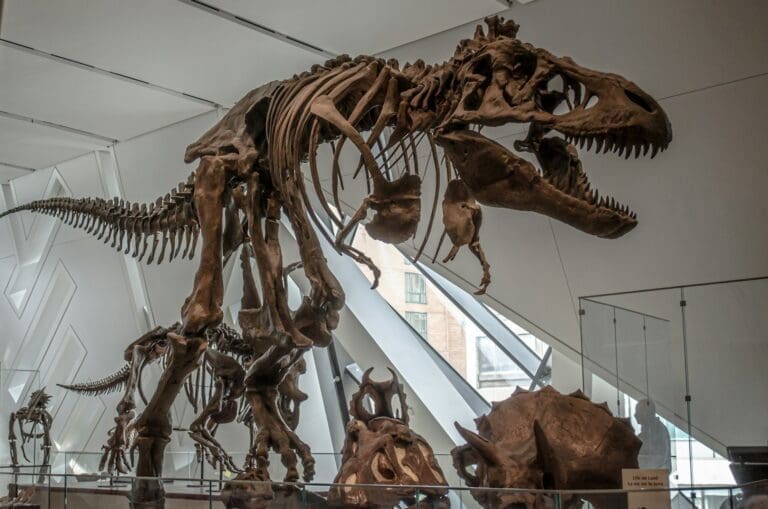When I was a child, I loved dinosaurs.
I grew up watching Land Before Time, the Jurassic Park franchise, and other movies about dinosaurs. I remember visiting the Arizona Museum of Natural History where I saw life sized displays of dinosaur bones from the Mesozoic Era.
As a child, I wanted to be like Dr. Allen Grant from Jurassic Park. I wanted to be a paleontologist who was out digging up dinosaur bones. Every time someone asked me what I wanted to be when I grew up, I would jump up and tell them about dinosaurs.
At that age, I knew more about dinosaurs then most adults. I could name different species based on the time period, describe their dietary habits, and even point to where they were discovered. My passion for paleontology was so strong that I believed that I would build my career in this field even in my teens.
That is… until one day I watched a documentary that changed my entire worldview.
I don’t remember the title, but the documentary showed the real work that paleontologists do. One paleontologist spent his time in the Northern ice caps where he spent his time in a small room with large cylinders of ice. Within these cylinders were small air bubbles that were trapped from years of ice build-up.
And the job of this paleontologist was to extract the air from these bubbles, test for the amount of carbon dioxide, and use that data to identify what time period these bubbles were from. Back then, the atmospheric composition was different. Oxygen levels were higher and carbon dioxide levels were lower which made it easy to chart the carbon dioxide levels across prehistoric times.
Now, not all paleontologists do this kind of lab work. However, it created a startling realization within me. The likelihood that I would be a paleontologist in charge of a dig site was highly unlikely. There is little demand for it and in between digs, I would need to find work that would pay the bills. Many paleontologists do this through academia. Some become professors. Others dedicate their life to research and publishing books and journal articles.
Reality had hit me with a punch in the gut. My fantasy was shattered and I knew that I would have to pursue something different. I had no interest in carbon dating, academia, or writing grants to get research funding.
And that was the death of my childhood dream.
My Take On The "Follow Your Passion" Debate
I recently read Cal Newport’s book So Good They Can’t Ignore You, and the main thesis of his book is that following your passion for a particular topic or skill does not equate to a sustainable career. After discussing the book with some of my peers, the consensus was pretty clear: passion is important as it gives the individual a baseline to build their skillset.
If you do not like a particular activity, how can you expect to do it sustainably in your life?
Yet, the book says that following your passion is bad advice. It gives examples of people who abandon their careers to pursue an activity there are not particularly skilled at. The lack of financial return often forces them to return to their previous line of work as they couldn’t make ends meet.
So on one hand, conventional wisdom says that by following your passions, you will acquire skills that immerse you in your interests. And on the other hand, Cal Newport says, building your skills like a craftsman is the first step to success because it is through competence that passion develops.
If I were to choose, I would give the unsatisfying answer and say both sides are too reductive.
In order to really understand passion, you must clearly define it.
The root of the word passion stems from the Latin word Patior which translates “to suffer.”
Passion is the journey of enduring smaller pains to achieve a desired outcome. Therefore, passion is measured by the suffering that has transpired. The more time, energy, and agony dedicated to a specific goal, the more passionate the person. Passion is where you consistently challenge yourself to exceed your limitations and create new possibilities.
Conventional use of the word has led to the association of the word passion with identity. I could say that I am passionate about playing music, even if I only spend 15 minutes a month practicing guitar. Through careful omission, I could build an identity with my social circle around this passion even though I don’t particularly have the skill to show for it. In this example, labels like musician, guitarist, and artist can take center stage, propping myself up to appear as a someone cooler than I am.
However, I admit, to my chagrin, that I do not commit much time to it. After 15 minutes, my fingers hurt and I put the guitar away. My fingers don’t even have calluses because of how infrequent I play. As a modern adult, I have plenty of other responsibilities that demand my immediate attention and that is okay. I acknowledge that I choose to put guitar practice on the lower end of my list of priorities. With that said, I also must accept the fact that if I wanted to be a better player it would require much more deliberate practice, even if it started with 10 minutes a day.
This is not to encourage gatekeeping, rather an acknowledgement that great skill takes deliberate practice and commitment. And that leads to why I think the passion debate is reductive. It oversimplifies the idea of passion to specific activities we enjoy doing without exploring what drew us to that activity in the first place. And I think the book is quick to forget that passion begins with liking the activity.
I will say though that So Good They Can’t Ignore You does a great job of explaining the importance of building “career capital.” With time and focus, you acquire the capacity to make greater demands in your industry that enable you to reap the rewards of a fulfilling career. His book pushes the concept that competence inspires confidence, ultimately leading to passion. I see this in my own career as well.
Despite my status as a professional writer, it may surprise you that I do not see myself as someone who has a “passion for writing” for it’s own sake. I wake up in the morning and show up to work, just like you. My line of work just happens to be focused in the writing discipline. I build my craft and more importantly, I write and edit content often.
You might ask, then why write at all?
I write because I know that I can help people by expressing ideas in a manner that easy to understood. Writing is the medium that allows me to contribute meaningfully to the community. The passion comes with the creative expression.
Breaking Passion Into its Core Components
Passion is a culmination of 4 elements:
Core intention: What is the purpose of the activity? Which core skill are you engaging? (problem solving, organizing, communicating, socializing, teaching, helping someone, creative expression etc.)
Medium: What activity or field is the medium for your core intention? (from playing music to building spreadsheets to marketing to project management)
Desired Outcomes: What big and small goals are you looking to achieve as a result of this continued pursuit? (Helping someone, solving a complex problem, discovering something new, building something from nothing, improving existing infrastructure, overcoming limitations, exceeding metrics)
Suffering: What is the price to achieve that outcome?
At the beginning I shared the story about how I tragically gave up my childhood ambition to pursue paleontology. My perspective of paleontologists was limited to the scope of digging up dinosaur bones and figuring out how these different species fit in the prehistoric ecosystem. In a sense, my desired outcome was to be a treasure hunter of sorts and I built an expectation that I could travel the world hunting for dinosaur bones.
However, I was missing some key elements. To achieve those goals, I would need the authority to go on these dinosaur digs and I would need to suffer through years of academia to even get a chance to attend an excavation. And I was not willing to pay that price, especially since dinosaur bone excavations are uncommon.
The challenge that many people have is that they conflate the desired outcomes of their passion with the act itself. A businessman may envy the Buddhist monk for his ability to be free from stress and frustration of modern life but is not willing to suffer through the process of detaching himself from material belongings and outcomes. In which case, he was looking for the freedom from his anxiety, not the lifestyle of a monk.
In order to call yourself passionate about something, you need to like the medium and the core intention that drives it. A musician enjoys playing music because it channels their creative talents. A person passionate about cooking loves sharing delicious flavors with those they love.
When you have an activity you enjoy that taps into one of your core skills, you are more likely to be willing to suffer for it. Suffering comes in many forms – consistent and diligent practice, overcoming failure, ostracism, and criticism, acquiring expert knowledge, and the constant pursuit for personal improvement.
Through suffering, you achieve your desired outcomes. Life is generally more rewarding, and you build the confidence to endure greater challenges.
Stagnant Passions
A passion without suffering is a fantasy that will never come to fruition. You cannot grow in your passion without pushing yourself beyond your limitation.
And yet, so many people are caught in a state of stagnation. They know they enjoy the activity and they feel the passion for it, but when push comes to shove, their passions are overshadowed by other activities.
Some procrastinate through busywork. Others belittle themselves as a result of their inner insecurity. If left alone for too long, one might go their whole life avoiding their passions in fear of being inadequate. This self-fulfilling prophecy leads to bitterness and disappointment. None of this is new, yet it seems like so many people find themselves trapped in a prison of their own making.
The only true way to build the confidence needed to pursue your passions is to start by making small commitments. Break down your next big step into many smaller steps. Slowly work your way through each milestone until you reach a point where you are able to look back and appreciate your progress. There is a quote I remember reading that goes something like this:
"When climbing a mountain, don't look to the summit for inspiration, look behind you and see how far you have come."
Sometimes You Have to Prioritize One Passion Less So Another One Can Blossom
I don’t feel any sense of loss over my childhood dream of being a paleontologist. If anything, I think it was a needed sacrifice. Life led me a different direction. At one point, I thought I would be an engineer, but I wasn’t interested in the subject. Then, I tried to learn programming, but I hated how mind numbing it felt (no disrespect to programmers). It was only during COVID-19 that I became a professional writer because I liked learning new things and writing about it.
As we get older, we tend to fixate on professional standards and play comparison games. It is okay to dabble in one passion to allow yourself the time and energy to focus deeper on another. I spend significantly more time writing than I do playing guitar. And despite the pain in my fingers from trying to play guitar, I enjoy every minute of it, whether I am watching tutorials from Marty Music or listening to Internal Flight by Estas Tonne.
We can acknowledge the costs to achieve greatness, but I don’t think it is necessary to be great at everything. You only have 24 hours in your day and it should be spent on the things that matter most to you. And sometimes the suffering portion of pursuing a passion, is the intentional choice to sacrifice time from other things, so you can be great at something.
When it comes to passion, the greatest action you can take is to embrace the suffering that comes with it. Try new things, get frustrated, and achieve breakthroughs in your pursuit for something greater. Or in the words of one of my favorite childhood icons, Mrs. Frizzle,
Take Chances, Make Mistakes, and Get Messy!





